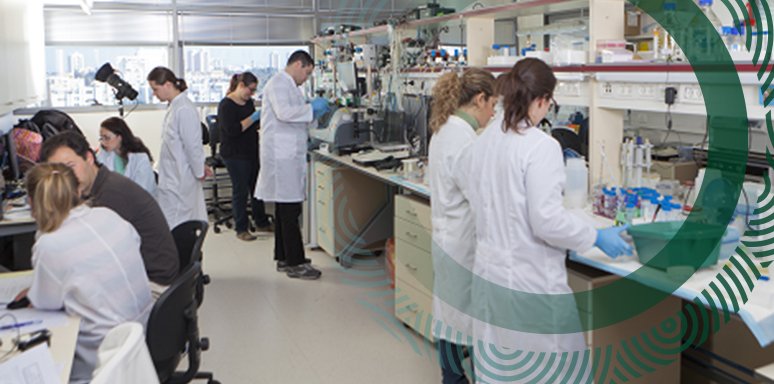Corona Virus Research at BIU
Researchers Work Around the Clock on Coronavirus-Related Study
Approximately 60 teams from Bar-Ilan University are working around the clock on research projects related to the coronavirus. This extensive activity is being led by University President Prof. Arie Zaban and Vice President of Research Prof. Shulamit Michaeli, who have identified the value of interdisciplinary research that addresses a variety of aspects -- from scientific-medical to social psychological – related to the virus.
Developing a vaccine, bacteria-resistant fabrics, rapid detection, and mathematical models detailing lockdown exit strategies, recruiting AI technology to fight the virus, studying the impact of the corona crisis on couples, researching organizational leadership in work-shifting environments and the effect of the crisis on pregnant women are just some of the research projects currently underway at the University. Bar-Ilan's leading researchers, along with international partners and organizations operating in the field, are working to try to address this global challenge.
"We are proud to partner in the national and global effort to curb the pandemic," says Bar-Ilan University President Prof. Arie Zaban. "Our researchers combine their extensive knowledge in medicine and psychology, life sciences and nanotechnology, computer science, math and humanities, to improve diagnostic and treatment capabilities, and to devise strategies to help resolve the crisis that has changed the entire world."
"High level research capabilities and the ability to tackle the challenge in an interdisciplinary manner enable us to work towards a positive impact in dealing with this virus. I am proud of our researchers who, even in a period of traffic restrictions and closures, are in their labs on a daily basis, in accordance with the guidelines, working to find breakthrough solutions to problems that plague us all. ”
Alongside this research Bar-Ilan University quickly transferred its courses to an online format so that studies and research would not be compromised. In addition, the University's digital campus offers a package of services including online student administration sections, a service hotline, and extensive electronic databases through the library system.
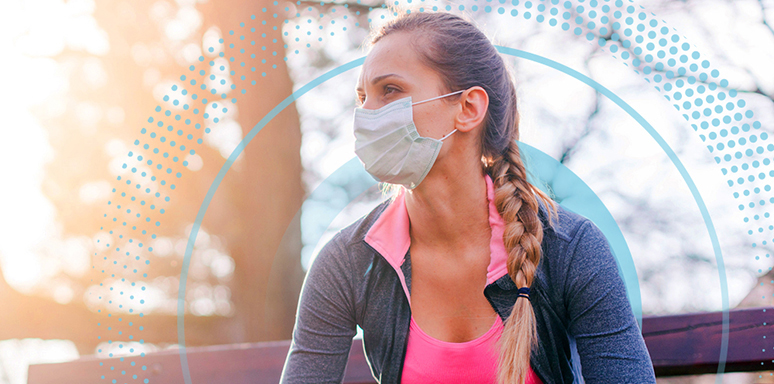
Math Department Researchers Present Strategy for Exiting Coronavirus Lockdown
Most projections indicate that social distancing – from mobility restrictions to complete lockdowns -- may take many weeks, possibly even months, a potentially devastating outcome for social and economic stability. One of the challenges is that the sick cannot be selectively isolated, since many of the spreaders remain pre-symptomatic for a period ranging from several days to as much as two weeks - invisible spreaders that continue to be socially active. Hence, it seems that without a population-wide lockdown isolating the carriers cannot be achieved effectively.
To bypass this challenge, Bar-Ilan University researchers, led by Dr. Baruch Barzel of the Department of Mathematics, have devised a strategy based on alternating lockdowns: first splitting the population into two groups, then alternating these groups between lockdown and routine activity in weekly succession. Together with isolation of the symptomatic spreaders and the adoption of everyday prophylactic behaviors, this strategy can help defeat the virus, while sustaining socio-economic activity at a 50% level.
In the alternating lockdown routine, society will be partitioned into two groups, with little interaction between them -- one half active this week, and the other active only the next. This will already slow the spread, but its main advantage is that it helps isolate the invisible spreaders, such as those who are pre-symptomatic carriers still in the incubation period. "Consider an individual who became infected during their active week. They are now in their pre-symptomatic period – the most dangerous stage, in which they are invisible spreaders. The crucial point is that, according to the alternating lock-down routine they are now scheduled to enter their lock-down phase" explains Dr. Barzel. "Staying at home for another week, they will most likely begin to exhibit symptoms, and therefore remain in isolation until full recovery. Indeed, if following a week of lock-down they show no symptoms, they are most likely uninfected and can partake in social and professional activities during their active week. Therefore, alternating lockdown with full isolation of symptomatic spreaders ensures that at all times, the majority of invisible spreaders are inactive, as their incubation period is naturally directed towards their lockdown phase."
At present, most people are extremely cautious, and will refrain from any contact with someone showing symptoms. "Therefore, we believe that it is the invisible spreaders that are the main contributors to the proliferating case count. Our strategy is precisely directed at this challenge -- placing each person on weekly lockdown after they were potentially exposed during their active week. Hence, we effectively isolate not just the sick, but also the majority of the pre-symptomatic carriers," says Barzel.
To examine this Barzel and team simulated the spread of COVID-19 using the SEIR model, assuming that only the invisible spreaders contribute to the infection. This model tracks the number of individuals as they transition between the different stages of the disease: Susceptible (those available to contract the disease), Exposed (those who are at their pre-symptomatic stage), Infected (those who develop symptoms), and Recovered (those who are already immune).They found that employing their strategy significantly reduces the spread and helps flatten the curve. "We can achieve more if we also adopt responsible behavior. Specifically, we expect that even during their active week, people will continue to interact with caution: avoid physical contact, increase personal space and practice hygienic behavior. These additional measures, when coupled with our alternating lockdown strategy, can help inhibit the spread, allowing us to overcome COVID-19 with reasonable economic consequences," he says.
Sustaining restrictive measures such as lockdowns is always a challenge, since some percentage of the population may not cooperate, especially in democratic and individualistic societies. The researchers therefore allowed for a fraction of defectors who continue to be active even during their lockdown phase in their simulation. This can also represent exempt individuals who hold essential positions and cannot be under lockdown. They found that even under 30% of non-cooperators would still overcome the viral spread.
The proposed weekly succession is aimed to sustain a functional economy in these challenging times. The researchers believe that, providing an outlet for people to continue their social and professional activity, at least at 50% capacity, will, in and of itself encourage cooperation, as it relaxes some of the individual stress endured under lockdown.
Barzel and team's mathematical analysis and numerical results, including all their codes, was recently published on the Arxive. Since publication the strategy has gained immense traction. Barzel and team have been approached by the Israel National Security Council and have presented the strategy to the academic committee advising the government. They were also contacted by international groups in the US advising 17 governments around the world. Barzel believes there is a good chance that his team's suggestion will be implemented, most probably together with complementary mitigation measures.
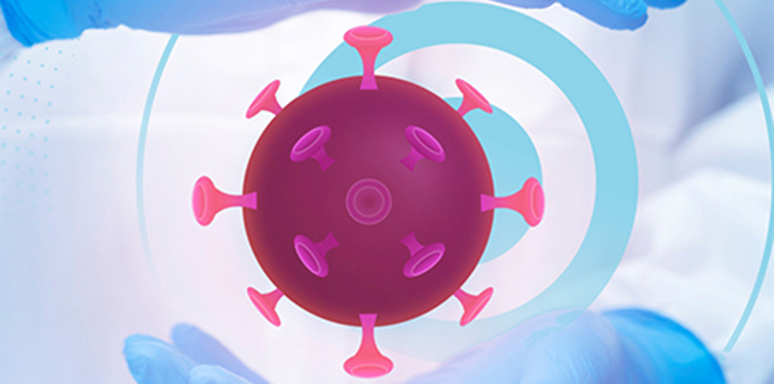
Researchers Develop Technology That Transforms Tap Water into Powerful, Environmentally-Friendly Disinfectant Against Viruses, Including Coronavirus
Researchers from Bar-Ilan University have developed new methodologies to produce powerful, environmentally-friendly disinfectants, based on tap water, that can eliminate bacteria and kill viruses, including microbes from the coronavirus family. The ability to turn ordinary tap water into virus-fighting materials was developed and patented by Dr. Eran Avraham, Dr. Izaak Cohen, and Prof. Doron Aurbach, who leads the electrochemistry group in the Department of Chemistry and Institute of Nanotechnology and Advanced Materials at Bar-Ilan University. The materials were recently tested by Dr. Inna Kalt and Dr.Tatiana Borodiansky Shteinberg in the lab of Prof. Ronit Sarid, of the Mina and Everard Goodman Faculty of Life Sciences at the University, and proven effective in neutralizing corona-type viruses.
The disinfectants are effective and safe to use, and do not contaminate groundwater. The technology works through an array of nanometer-shaped electrodes with unique surface properties. The meeting between water and electrodes creates a cleaning material in a unique aquatic environment. The combination of these compounds gives rise to an effective antibacterial capability for microorganisms (bacteria, viruses and spores), while at the same time is safe for macro organisms (larger bodies such as skin cells).
The platform on which the technology is based enables the preparation of a variety of solutions for clean spaces from bacteria, such as spray-aerosols (for disinfecting surfaces, appliances, beds, closets, bathrooms, toilets, etc.), containers for immersion (washing devices, hands etc.), disinfectant wipes, hand washing, shoe washing, buckets for washing and disinfecting floors, air-conditioning systems, washing machines, and dry fog air-purifiers. The ability to produce electrodes in a variety of shapes and textures makes the technology suitable to almost any application – from a 'cassette' in an air conditioner, a container for washing fish and meat, to disinfection and removal of pesticides from vegetables and fruit, mobile spray, a device for manufacturing disposable antibacterial cloths and many other applications – even masks and gloves.
The antiseptic capability is 100 times more effective than bleach and therefore low concentrations of between 50 and 200 mg of the active materials per liter are enough to disinfect (unlike bleach, which by contrast requires between 5,000 and 20,000 mg per liter). They are also much more environmentally friendly and do not cause burns or dry skin. As such they may be effective in treating wounds, a possibility being investigated. They don't cause corrosion, and most importantly, with the very low concentration of 50 mg they eliminate all kinds of viruses.
In electrode-free containers, the disinfectants can remain effective for two months and may be sold in recyclable bottles. For reusable bottled products, a fairly simple process can be applied to enable long-term use.
"We examined the ability of these materials to impair herpes simplex virus type 1 infection and human coronavirus OC43. Both viruses were completely eliminated when exposed to the disinfectants for different periods of time. The structural characteristics of OC43 are similar to those of recent SARS-CoV-2 suggesting that this virus will also be easily eliminated with this disinfectant," said Prof. Sarid.

Coronavirus: Post-Trauma Expert Offers Tips for Assisting Holocaust Survivors to Cope with Current Crisis
Holocaust survivors account for about half of Jews over the age of 75 living in Israel. They belong to the age group most at risk for health complications from the coronavirus. The coronavirus has taken charge the lives of the elderly, including Holocaust survivors. The first victim of the virus in Israel, Aryeh Even, was a Holocaust survivor.
Holocaust survivors have exhibited a wide range of emotional reactions to and ways of dealing with COVID-19, says Prof. Amit Shrira, of the MA Program in Gerontology and the Interdisciplinary Department of Social Sciences at Bar-Ilan University. Some are dealing well with the current crisis, anxiety from the virus and distancing from family members, while some experience considerable difficulties. The way survivors deal with the current crisis is largely derived from how they deal with their traumatic memories of the Holocaust. Survivors who have been able to process the war memories demonstrate resilience in the face of the daily challenges of the corona crisis. By contrast, those who still suffer from painful memories and nightmares are facing considerable difficulties.
"We must remember that Holocaust survivors struggle throughout their lives in trying to bridge between trauma and everyday life. The vast majority of Holocaust survivors exhibit good, and even excellent, emotional and social functioning, and most of them have established families and developed careers. Moreover, the survivors who are alive today have reached a remarkable age. Survivors' achievements are a source of personal strength, and it is quite likely that their survival skills in difficult traumatic conditions may help them cope with the new reality forced upon them by the corona pandemic. For example, one can hear Holocaust survivors who put the dangers of coronavirus, isolation and difficulties involved into other proportions. They draw on the power of surviving hell on earth, believe in their ability to cope this time as well, manage to establish a meaningful daily routine, focus on moments of comfort and enjoyment such as conversing with children and grandchildren, and cling to optimism about the future," says Shrira.
Alongside impressive resilience, in the inner world of quite a few Holocaust survivors operates a sensitive system of perceptions and emotions affected by their traumatic past. Research conducted by Shrira and colleagues shows that about a quarter of Holocaust survivors in the community suffer from post-traumatic stress disorder. This disorder is characterized by nightmares about the Holocaust, painful memories that invade the sub-conscience, great difficulty encountering Holocaust-related content, difficulty concentrating, restlessness, vigilance and increased panic reactions. This psychopathology also includes symptoms of depression, such as despondency and sadness, difficulty enjoying, low self-esteem and sometimes suicidal thoughts. These survivors perceive the world as a dangerous place and find it difficult to trust others. As a result, when exposed to stress, distress with particularly severe characteristics can emerge. They experience particularly powerful anxiety in situations that evoke connections to traumatic experiences that occurred during the Holocaust.
The coronavirus epidemic can lead to many situations that may provoke harsh war experiences among the survivors. For example, the fear of getting sick, losing control and independence, and of course, the fear of death are linked in the memory of many survivors to similar fears experienced during the war. At that time illness and weakness had one meaning -- a death sentence. Moreover, staying in solitary confinement while being separated by force from family, children and grandchildren "echoes" similar experiences from childhood, especially among survivors in hiding and those who experienced sudden and painful separation from parents and other relatives. Contact with the outside world and daily work helped to muffle and relieve difficult past memories, but now while they are closed in their homes, these memories and images return to their consciousness.
What can be done to provide relief to Holocaust survivors during this challenging period? "First and foremost, help and assistance must be provided and maintained with all means at our disposal while adhering to the Ministry of Health guidelines. Conversations with family and even volunteers and strangers will allay survivors' loneliness and allow them to share their experiences. Their voices must be heard so that survivors are not left with a deeper sense of loneliness and an experience that no one is willing to listen to their pain. Only after allowing them to express their feelings should they be encouraged. These conversations allow survivors to share their experience and wisdom of life and thus to feel valuable," says Shrira. Survivors who need support in coping with feelings of boredom and emptiness can be assisted by jointly thinking about goals that will refresh this new routine. Many recreational activities can stimulate interest and sense of meaning while also blurring and disseminating difficult memories and images from the past. These include reading, listening to music, solving puzzles, cooking and baking, writing and creating, general learning, digital skill development, and of course, physical exercise (even the most minimal one can do).

Chinese Alumni to Ship Vital Medical Equipment to Azrieli Faculty of Medicine
Over the coming days, three lifesaving shipments of medical equipment -- including protective suits, face shields, eye goggles, N95 masks, and surgical masks -- will arrive in Israel from China. Some of this vital equipment has been donated by the Bar-Ilan University Alumni Association in China and will be headed to the University's Azrieli Faculty of Medicine in Safed.
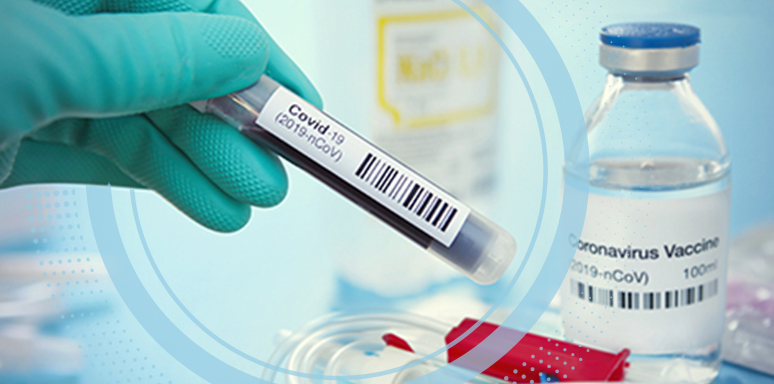
University to Test Autonomous Vehicle That Can Transport Coronavirus Patients
The Bar-Ilan University Smart Cities Center is set to begin experimenting with an autonomous minibus that can transport patients diagnosed with COVID-19 and medical equipment. The autonomous shuttle will be operated remotely, without a driver or operator, transporting patients for medical purposes.
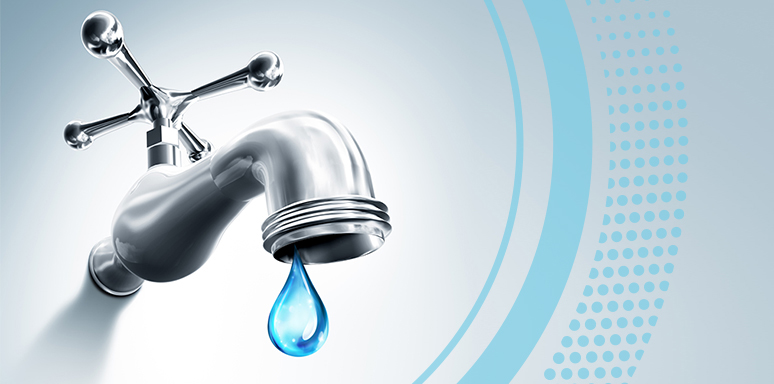
University Provides Advanced Equipment for Poriya Medical Center's Corona-Testing Laboratory
Bar-Ilan University has provided polymerase chain reaction (PCR) machines, which facilitate rapid diagnosis of coronavirus, to the clinical microbiology lab at the Baruch Padeh Medical Center in Poriya, one of several hospitals affiliated with the University's Azrieli Faculty of Medicine. The advanced equipment will help to increase the number of coronavirus detection tests being carried out at Poriya.
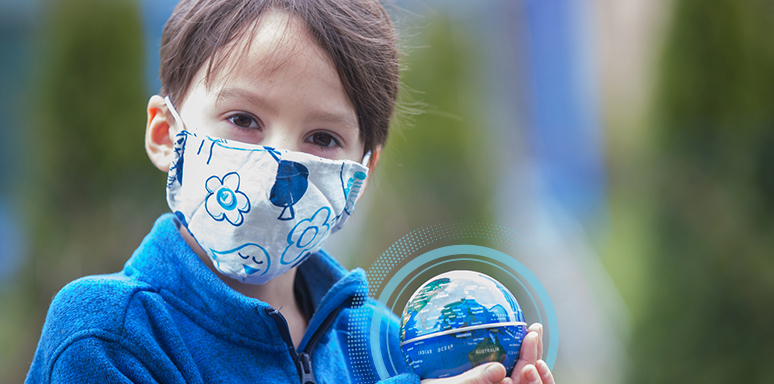
Medical Students Participate in Nationwide Volunteering Initiative
Israeli hospitals and universities, including Bar-Ilan University, have joined forces to build a student volunteer base to expand and improve the detection of people infected with novel coronavirus throughout Israel and assist overburdened hospitals process coronavirus tests in laboratories. George Naser and Wiaam Khatib, from the Azrieli Faculty of Medicine, are among the volunteers.
Engineering Student Uses Kalman Filter to Predict Spread of Coronavirus
Ran Kremer, a Master's student in the Alexander Kofkin Faculty of Engineering, has elucidated how the Kalman filter can accurately predict the worldwide spread of coronavirus and produce updated predictions based on reported data. The method has produced powerful short-term predictions virtually identical to reality.
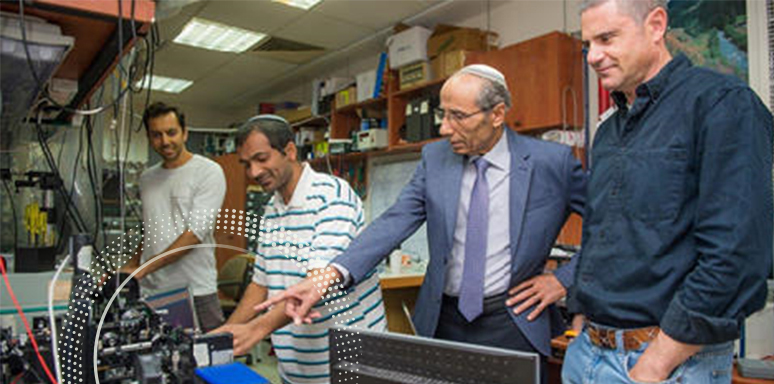
Coronavirus and the Challenges of Working from Home
The coronavirus outbreak has forced millions of people around the world not only to work from home but to evaluate the pros and cons in various aspects of this new arrangement. "Working from home has its advantages, but also drawbacks that must be properly addressed," according to Prof. Liat Kulik, of the Louis and Gabi Weisfeld School of Social Work.
Remote-Sensing Technology Monitors Initial Stages of Pneumonia
An optical remote bio-sensing technology developed by Prof. Zeev Zalevsky, Dean of the Alexander Kofkin Faculty of Engineering, and Prof. Javier Garcia, of the University of Valencia in Spain, can assist in the international effort for early diagnosis of coronavirus.
New Technology Developed by Dr. Amos Danielli May Significantly Reduce Diagnostic Time of Coronavirus
New technology based on a combination of optics and magnetic particles, developed by Prof. Amos Danielli, of the Alexander Kofkin Faculty of Engineering, can rapidly test 100 samples of patients potentially infected with the virus and reduce the diagnostic time to approximately 15 minutes.
